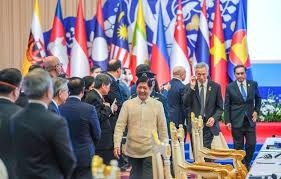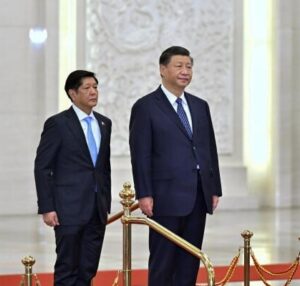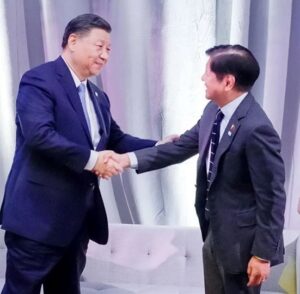I. A Principled Stand at the ASEAN-US Summit

KUALA LUMPUR, Malaysia — Philippine President Ferdinand Marcos Jr. delivered a sharp and unequivocal rebuke against China’s recent actions in the South China Sea, specifically targeting its unilateral declaration of a “nature reserve” over Scarborough Shoal (known locally as Bajo de Masinloc). Speaking before his counterparts from the Association of Southeast Asian Nations (ASEAN) and United States President Donald Trump at the ASEAN-US Summit on Sunday, October 26, President Marcos asserted that this move constitutes a clear violation of international law and Philippine sovereign rights.
Marcos emphasized the shoal’s significance to the Philippines, stating:
“The attempt of some actors to establish the so-called ‘nature reserve’ status over Bajo de Masinloc or Scarborough Shoal, which is a long-standing and integral part of the Philippines over which it has sovereignty and jurisdiction, clearly violates not only Philippine sovereignty, but also the traditional fishing rights of our people guaranteed by international law, including the 1982 UNCLOS, and affirmed by the final and binding 2016 Award on the South China Sea Arbitration and relevant domestic laws.”
The statement was delivered at a high-level diplomatic forum, notably the only ASEAN meeting attended by U.S. President Trump during his brief stop in the region, underscoring the importance of the issue to Manila’s primary treaty ally.
II. The Legal and Historical Context of Scarborough Shoal
Scarborough Shoal, a collection of high-tide elevations, falls well within the Philippines’ 200-nautical-mile Exclusive Economic Zone (EEZ). While Manila asserts its territorial claim over the feature, access to the shoal has been effectively controlled by Beijing since the tense standoff between the two nations in 2012.
China’s current control has unfortunately translated into a pattern of escalating aggression. Its Coast Guard (CCG) vessels and accompanying maritime militia routinely engage in harassment and coercive tactics against Philippine vessels, ranging from government civilian ships to the small fishing boats of Filipino fisherfolk.
The timing of China’s “nature reserve” announcement is particularly provocative, coming just a month after a documented collision involving a CCG ship and a Chinese Navy vessel occurred near Scarborough Shoal while they were attempting to drive away a Philippine Coast Guard vessel.
The U.S. immediately condemned Beijing’s proposal. U.S. Secretary of State Marco Rubio had previously criticized the plan as “destabilizing and coercive,” reinforcing Washington’s commitment to upholding international maritime law and freedom of navigation in the vital waterway.
It is important to recall that the 2016 Permanent Court of Arbitration ruling, which President Marcos referenced, did not determine the ultimate question of sovereignty over the shoal. Instead, it definitively ruled that since Scarborough Shoal is a traditional fishing area utilized by Filipino, Chinese, and Vietnamese fisherfolk, access for all should not be obstructed. Despite the ruling’s final and binding nature under international law, China continues its policy of non-recognition.
III. Raising Alarm on Incidents in the West Philippine Sea

President Marcos broadened his critique to encompass a wider array of dangerous activities occurring throughout the West Philippine Sea (WPS)—the term Manila uses to delineate the parts of the South China Sea within its EEZ and claimed features.
He drew specific attention to “incidents” that “endanger the lives of Philippine personnel and compromise the safety of our vessels and aircraft.”
“These include dangerous maneuvers and the coercive use of tools and equipment to interfere with or obstruct legitimate and routine Philippine activities in our own maritime zones and airspace, as guaranteed under international law, particularly UNCLOS,” Marcos stated.
Although the President refrained from naming the perpetrator, the context is unambiguous: the aggressive maneuvers and coercive interference targeting Philippine vessels and personnel are almost exclusively carried out by China’s CCG and maritime militia ships operating in the WPS.
IV. Direct Confrontation with Chinese Premier Li Qiang
The Philippine President reiterated his firm stance the following day, Monday, October 27, at the East Asia Summit (EAS), a crucial meeting attended by ASEAN leaders, U.S. partners, and, significantly, Chinese Premier Li Qiang.
With the Chinese Premier present, Marcos repeated the condemnation, stating plainly: “Just recently, our northern neighbor has declared a so-called ‘National Nature Reserve’ in Bajo de Masinloc or Scarborough Shoal. We strongly protested such a declaration.”
He further asserted the Philippines’ exclusive legal authority over its maritime resources and environmental policy: “The Philippines likewise has the exclusive authority to establish environmental protection areas over its territory and relevant maritime zones,” he added.
Marcos’s strategy was clear: to utilize the high-profile regional and international platforms to firmly articulate the Philippines’ legal and sovereign position directly to Beijing and to the broader international community, emphasizing that such unilateral declarations are fundamentally illegitimate.
V. Commitment to Dialogue and the Code of Conduct

Despite the sharp diplomatic confrontation, President Marcos maintained that the Philippines remains committed to regional stability and constructive engagement. Still addressing the EAS, Marcos affirmed the Philippines’ dedication to reaching a political and legal instrument that could effectively manage the maritime environment:
“We will continue to uphold our sovereignty, rights, and jurisdiction as we engage constructively to manage differences. The Philippines is committed to an effective and substantive Code of Conduct that can effectively govern the behavior of parties at sea.”
He then offered a diplomatic olive branch by referencing a provisional agreement between Manila and Beijing regarding the rotation and resupply missions to Ayungin Shoal—another flashpoint feature in the WPS occupied by Manila.
“Diplomacy and dialogue can ease tensions, provided that commitments are honored and translated into sincere action from both sides,” Marcos concluded, subtly placing the onus on China to demonstrate good faith and respect for agreed-upon arrangements.
This entire episode underscores the increasingly precarious security situation in the South China Sea, where China’s expansive and baseless nine-dash line claim—invalidated by the 2016 arbitral award—continues to threaten the sovereignty of its neighbors. It also highlights the critical importance of the Mutual Defense Treaty with the United States, which obligates Washington to defend the Philippines in the event of an armed attack on its vessels or personnel in the South China Sea, serving as Manila’s essential geopolitical anchor.





